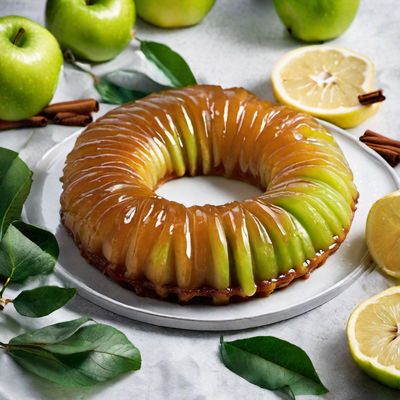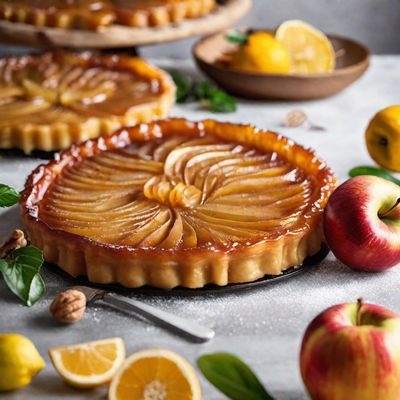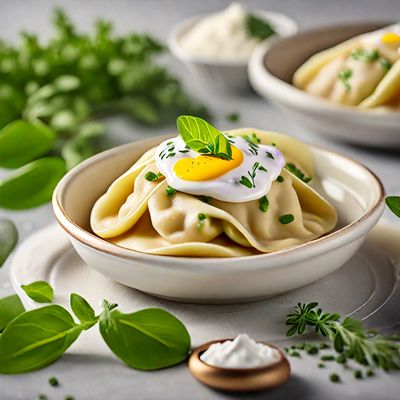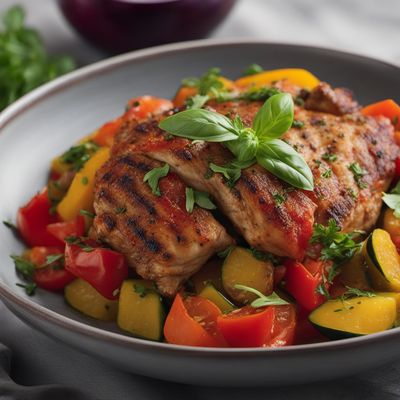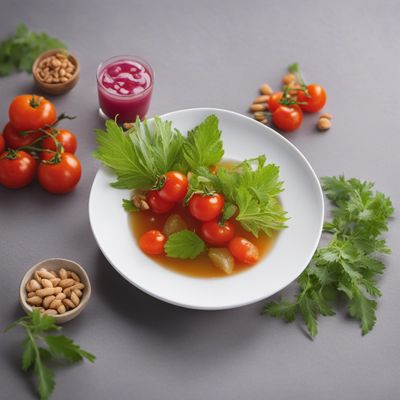
Recipe
Molecular Tarte Tatin
The Transformed Tarte Tatin: A Molecular Gastronomy Delight
4.8 out of 5
In the realm of molecular gastronomy, the classic French Tarte Tatin undergoes a fascinating transformation. This avant-garde adaptation combines the traditional flavors of caramelized apples and buttery pastry with innovative techniques and presentations. Get ready to embark on a culinary journey that merges science and artistry, resulting in a visually stunning and delectable dessert.
Metadata
Preparation time
30 minutes
Cooking time
25-30 minutes
Total time
55-60 minutes
Yields
4 servings
Preparation difficulty
Medium
Suitable for
Vegetarian, Gluten-free (if using gluten-free puff pastry), Nut-free, Soy-free, Egg-free
Allergens
Wheat (in puff pastry), Milk (in butter and puff pastry)
Not suitable for
Vegan, Dairy-free, Paleo, Keto, Low-carb
Ingredients
The molecular gastronomy version of Tarte Tatin deviates from the original by incorporating modern techniques and presentations. The dish may feature elements like apple caviar, caramel foam, or edible apple spheres. The focus is on creating unique textures, intensifying flavors, and surprising the palate with unexpected culinary experiences. We alse have the original recipe for Tarte Tatin, so you can check it out.
-
4 apples, peeled, cored, and sliced (500g) 4 apples, peeled, cored, and sliced (500g)
-
100g sugar 100g sugar
-
50g butter 50g butter
-
1 sheet of puff pastry (250g) 1 sheet of puff pastry (250g)
-
Liquid nitrogen (for molecular elements) Liquid nitrogen (for molecular elements)
-
Edible gold leaf (for garnish) Edible gold leaf (for garnish)
Nutrition
- Calories: 350 kcal / 1465 KJ
- Fat: 18g (Saturated Fat: 10g)
- Carbohydrates: 45g (Sugars: 25g)
- Protein: 3g
- Fiber: 3g
- Salt: 0.2g
Preparation
-
1.Preheat the oven to 180°C (350°F).
-
2.In a non-stick skillet, melt the butter over medium heat. Add the sugar and cook until it caramelizes and turns golden brown.
-
3.Carefully add the apple slices to the caramel and cook for 5 minutes, stirring occasionally.
-
4.Transfer the caramelized apples to a round baking dish, arranging them in a single layer.
-
5.Roll out the puff pastry sheet and place it over the apples, tucking in the edges.
-
6.Bake in the preheated oven for 25-30 minutes, or until the pastry is golden brown and crispy.
-
7.Remove from the oven and let it cool for a few minutes.
-
8.For molecular elements, use liquid nitrogen to create apple caviar or edible apple spheres. Follow proper safety precautions when handling liquid nitrogen.
-
9.Garnish the Tarte Tatin with the molecular elements and a touch of edible gold leaf for an elegant presentation.
Treat your ingredients with care...
- Apples — Choose firm and slightly tart varieties like Granny Smith or Braeburn for the best flavor and texture.
- Puff pastry — If desired, you can make your own puff pastry from scratch or use store-bought for convenience. Ensure it is thawed if using frozen pastry.
Tips & Tricks
- To create apple caviar, use a technique called reverse spherification with apple juice and calcium lactate gluconate.
- For edible apple spheres, use a technique called basic spherification with apple juice and sodium alginate.
- Experiment with different shapes and sizes of the molecular elements to add visual interest to the dish.
- Serve the Molecular Tarte Tatin warm for the best flavor and texture.
- If liquid nitrogen is not available, you can omit the molecular elements and focus on the caramelized apples and puff pastry.
Serving advice
Serve the Molecular Tarte Tatin as a stunning dessert centerpiece. Plate each portion with care, ensuring the caramelized apples are beautifully arranged and the molecular elements are strategically placed. Accompany it with a scoop of vanilla ice cream or a dollop of whipped cream for a delightful contrast of temperatures and flavors.
Presentation advice
Create an artistic presentation by arranging the caramelized apple slices in a circular pattern on the plate. Place the puff pastry on top, slightly off-center, to showcase the golden brown color and flaky texture. Add the molecular elements around the plate, creating a visually captivating composition. Finish with a sprinkle of edible gold leaf for an elegant touch.
More recipes...
For Tarte Tatin » Browse all
For French cuisine » Browse all
More French cuisine dishes » Browse all
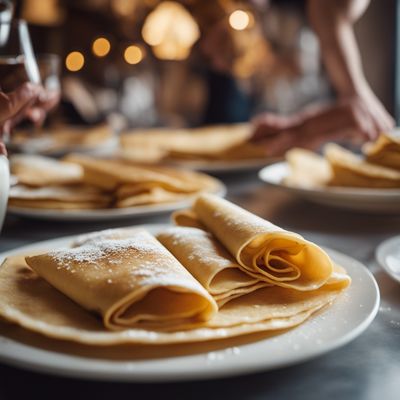
Crêpes Normande
Normandy-style crepes
Crêpes Normande is a classic French dish that is perfect for breakfast or brunch. It is a thin pancake filled with a creamy apple filling and...
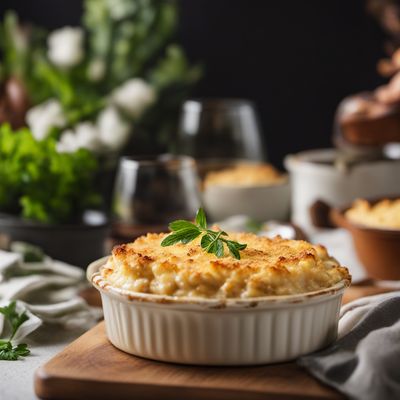
Gratin
Gratin is a French dish made with a creamy sauce and topped with cheese and breadcrumbs. It is a popular comfort food and often served as a side...

Farçon de Séez
Farçon de Séez is a traditional French dish that is perfect for breakfast or brunch. It is a savory dish that is made with potatoes, onions, and bacon.
